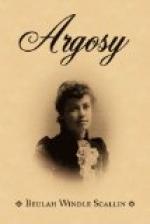Down sat Captain Monk on a bench of his own accord. Tears rose to his eyes. The sudden revulsion of feeling was great: and truly he was a changed man.
“You spoke of Heaven, Harry. I shall begin to think it has forgiven me. Let us be thankful.”
But Captain Monk found he had more to thank Heaven for ere many minutes had elapsed. As Harry Carradyne sat by him in silence, marvelling at the change, yet knowing that the grievous blow which was making havoc of Eliza had effected the completeness of the subduing, he caught sight of an approaching fly. Another fly from the railway station at Evesham.
“How dare you come here, you villain!” shouted Captain Monk, rising in threatening anger, as the fly’s inmate called to the driver to stop and began to get out of it. “Are you not ashamed to show your face to me, after the evil you have inflicted upon my daughter?”
Philip Hamlyn, smiling kindly and calmly, caught Captain Monk’s lifted hands. “No evil, sir,” he said, soothingly. “It was all a mistake. Eliza is my true and lawful wife.”
“Eh? What’s that?” said the Captain quite in a whisper, his lips trembling.
Quietly Philip Hamlyn explained. He had taken the previous day to investigate the matter, and had followed his wife down by a night train. His first wife was dead. She had been drowned in the Clipper of the Seas, as was supposed. The child was saved, with his nurse: the only two passengers who were saved. The nurse made her way to a place in the south of France, where, as she knew, her late mistress’s sister lived, Mrs. O’Connett, formerly Miss Sophia Pratt. Mrs. O’Connett, a young widow, had just lost her only child, a boy about the age of the little one rescued from the cruel seas. She seized on him with feverish avidity, adopted him as her own, quitted the place for another Anglo-French town where she was not previously known, taught the child to call her “Mamma,” and had never let it transpire that the boy was not hers. But now, after the lapse of a few years, Mrs. O’Connett was on the eve of marriage with an Irish Major. To him she told the truth; and, as he did not want to marry the child as well as herself, he persuaded her to return him to his father. Mrs. O’Connett brought the child to London, ascertained Mr. Hamlyn’s address, and all about him, and watched about to speak to him, alone if possible, unknown to his wife. Remembering what had been the behaviour of the child’s mother, she was by no means sure of a good reception from Philip himself, or what adverse influence might be brought to bear by the new ties he had formed. Mrs. O’Connett had the same remarkable and lovely hair that her sister had had, whom she very much resembled; she had also a talent for underhand ways.
That was the truth—and I have had to tell it in a nutshell, space growing limited. Philip Hamlyn had ascertained it all beyond possibility of dispute, had seen Mrs. O’Connett, and had brought down the good tidings.




